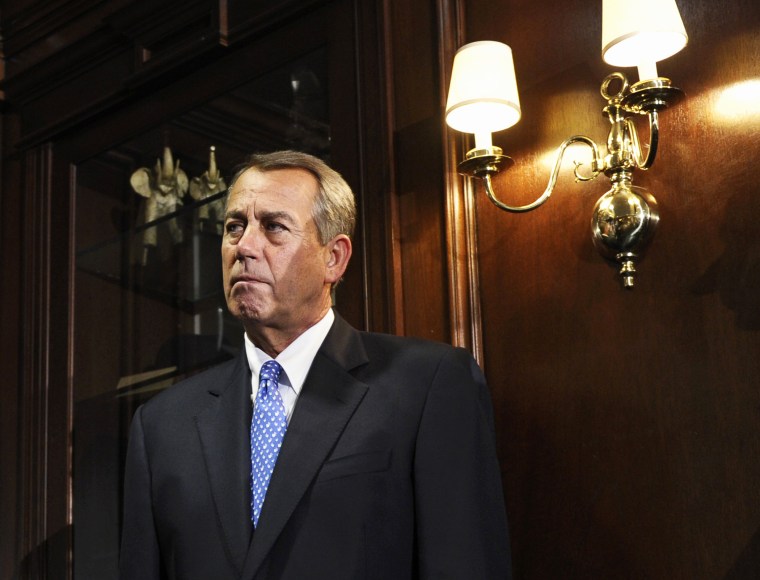Few voters would be surprised to learn Speaker John Boehner came out against a Senate bill banning discrimination against LGBT employees. For Republicans, that's a problem.
On Monday night, the Senate voted to open debate on The Employment Non-Discrimination Act, overcoming a filibuster with 61 votes thanks to support from a handful of Republicans. Not a single Republican Senator delivered a speech opposing its passage. President Obama is campaigning for the bill in the run up to the final vote, which is expected later this week.
Politically, voting "yes" should be a no-brainer. While support for gay marriage only recently crossed into majority backing, the margin is overwhelming for workplace protection. Republican pollster Alex Lundry found 68% of respondents supported its passage in September. Not only that, about to 8 in 10 respondents assumed incorrectly that such anti-discrimination measures were already in place. Both these results track closely with an earlier poll by the liberal Center for American Progress in 2011.
But majority support, even overwhelming majority support, isn't good enough for the House GOP on ENDA. Just as it isn't good enough on immigration or keeping the government funded without incident.
"The Speaker believes this legislation will increase frivolous litigation and cost American jobs, especially small business jobs," Michael Steel, a spokesman for Boehner, said in a statement.
While not an entirely new position for Boehner, who has claimed in the past that existing employment laws provide sufficient protection for LGBT Americans, his renewed criticism means ENDA will likely not get a vote in the House this year.
For the bill itself, Boehner's move is a temporary setback at best. As the polling indicates, ENDA will inevitably become law sooner or later -- likely sooner. Similarly, the trend toward legal gay marriage looks decisive at this point.
The segment of socially conservative Republicans strongly opposed to these measures can't hold back these floodwaters for much longer. But what they can control is how much political damage the party suffers after the dam bursts and LGBT rights are an unremarkable assumption of American life.
Republican strategists have been warning for years that gay rights are one of the most critical tests the party faces in the next few election cycles. That's because they're strongly associated with Millennial voters, the generation that's by far the most broadly accepting of gay marriage and LGBT rights in general. Many Republicans are worried the issue has become one of the key litmus tests these voters -- who went strongly for Obama in 2008 and 2012 -- apply to candidates to determine their vote.
"Already, there is a generational difference within the conservative movement about issues involving the treatment and the rights of gays -- and for many younger voters, these issues are a gateway into whether the party is a place they want to be," an exhaustive Republican National Committee report on the 2012 election concluded in March. That advice largely fell on deaf ears as the RNC unanimously reaffirmed its opposition to gay marriage the very next month to reassure nervous conservatives.
The reason the GOP's continued anti-gay lean is so dangerous politically is that the problem doesn't magically go away once support for gay rights inevitably becomes the default position for Republican politicians. Decades of political science research suggests voters determine their partisan affiliations in their first few elections and tend to follow them their entire lives, a phenomenon known as the "impressionable years" hypothesis. The "Greatest Generation" that grew up voting for FDR was still a Democratic bloc as late as 2004, just as the younger "Baby Boomer" and older "Generation X" voters who backed Ronald Reagan in their 20s and 30s are a critical middle-aged voting bloc for Republicans today.
Rep. Charlie Dent, a House Republican who supports ENDA, made clear in an interview with The Washington Post that he thought Boehner was making a mistake in part for that very reason.
“Younger voters would be much more accepting of the Republican Party if we were to adopt legislation of this type,” he said.
Millennials are already an electoral force, but they're still years form hitting their peak share of the electorate. Every year the Republican party continues to alienate them with issues like ENDA sharpens the generational spear heading towards the GOP.
